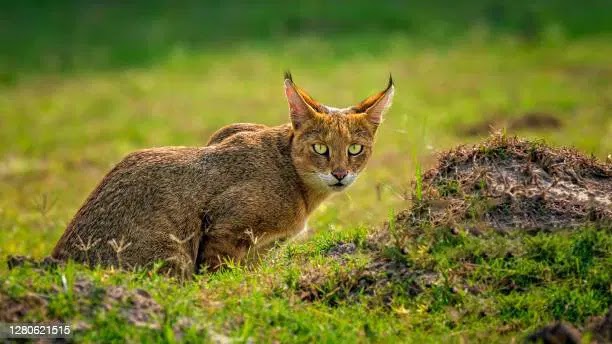The Jungle Cat, scientifically known as Felis chaus, is a captivating feline species with origins in Asia and Africa's vast landscapes. This medium-sized wild cat is shrouded in mystery and intrigue. We'll go over everything you need to know about the enigmatic in this comprehensive guide.
A Quick Look at the Jungle Cat:
- The body is sleek and slender, with sandy or grayish-brown fur with dark stripes and spots.
- Characteristics: A highly adaptable and skilled hunter who prefers to live alone.
- Popularity: Not as well-known as domesticated breeds, but gaining popularity among exotic cat enthusiasts.
- Temperament: Because they are fiercely independent and elusive, they are rarely kept as pets.
- Lifespan: They can live up to 10 years in the wild and slightly longer in captivity.
- Coat Color: Sandy to grayish-brown with faint stripes and spots.
- Original or Mixed Breed? : An original wild species. While it has not been extensively bred with domestic cats, it is related to other wild cat species such as the African wildcat, which can occasionally hybridize with domestic cats.
How to Care for a Jungle Cat
Food
Jungle Cats are naturally wild creatures with specific dietary needs:
- A Healthy Diet: Primarily hunt birds, rodents, and small mammals in the wild. They require a diet that closely resembles their natural prey in captivity.
- Raw Diet: Many owners choose to feed their animals raw meat, organs, and bones. To ensure a balanced diet, consult with a veterinarian.
- Clean, fresh water should always be available.
Environment
Creating an appropriate environment necessitates careful consideration of their natural instincts:
- If kept in captivity, it should have access to a large, secure enclosure with climbing structures and hiding spots.
- To keep their minds active, provide toys and puzzles that mimic hunting and foraging behaviors.
- Provide hiding places and quiet areas where they can retreat when needed.
Grooming
Although proficient groomers, occasional brushing can help remove loose fur and prevent matting. Otherwise, they don't require much grooming.
Method of Take Care
The primary goal of caring is to provide them with a stimulating environment that is similar to their natural habitat. They can be kept happy by providing opportunities for hunting-like play with toys and regular interaction.
How to Purchase/Adopt a Jungle Cat
Popular Tourist Destinations
Due to their wild nature, jungle cats are not commonly kept as pets. They may, however, be housed by exotic animal enthusiasts and wildlife rehabilitation centers.
Average Cost
Obtaining is highly regulated and illegal in many places. Furthermore, the costs of keeping a wild cat in captivity can be prohibitively expensive due to the need for specialized enclosures, permits, and veterinary care.
Communities for Adoption and Rescue
Because of the restrictions on their ownership, rescuing or adopting a Jungle Cat is uncommon. Before attempting to rescue or adopt a wild species, it is critical to follow local wildlife regulations and consult with authorities.
What to Look for Before Adoption or Purchase
If you live in an area where cat ownership is legal, make sure the cat has the necessary permits and was obtained legally. However, due to their wild nature, owning is not recommended for the average pet owner.
How to Prepare for a Life as a Jungle Cat
Three brief pieces of advice:
- Before considering it as a pet, make sure you have the legal right and capacity to own it.
- Seek expert advice on caring for these animals if you are a wildlife rehabilitator or involved in conservation efforts.
- If you come across an injured or distressed Jungle Cat in the wild, contact local wildlife authorities for assistance.
- Equipment Required:
- A safe and spacious enclosure surrounded by appropriate fencing.
- Toys and puzzles that simulate hunting and foraging activities.
- Water that is clean and fresh.
Common Illnesses:
- Parasitic infections can be controlled with regular deworming and preventative measures.
- Respiratory Infections: To avoid respiratory illnesses, maintain a clean and stress-free environment.
- Check for fleas, ticks, and mites on a regular basis.
Vaccines Required:
Unlike domestic cats, jungle cats are not typically vaccinated. Their treatment focuses primarily on their overall well-being and the prevention of stress-related illnesses.
Jungle Cat Common Names
Given their wild nature, naming is not a common consideration. If you find yourself caring for one in a wildlife rehabilitation or conservation setting, consider giving it a name that reflects its natural habitat, such as "Savannah" or "Wilderness."
Finally, Jungle Cats are fascinating wild creatures that thrive in their natural environments. While they are not suitable as pets, their presence in the wild helps to maintain the delicate balance of ecosystems. Those in need of assistance must be assisted by wildlife authorities and professionals to ensure proper care and conservation.
Readmore: https://blogcatsmeow.blogspot.com/2023/11/a-complete-guide-to-mysterious-jungle.html

